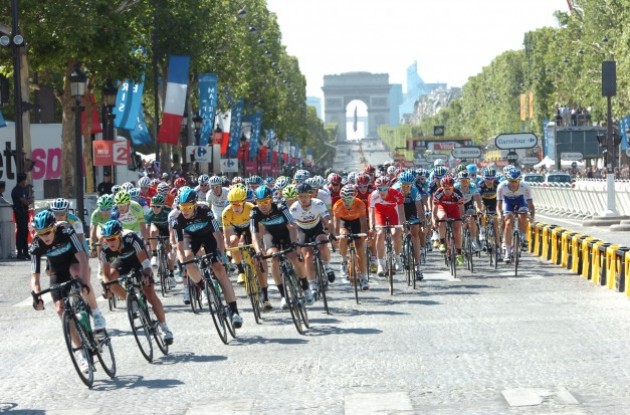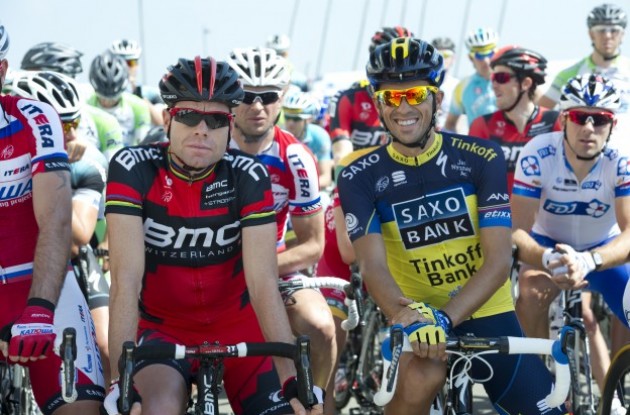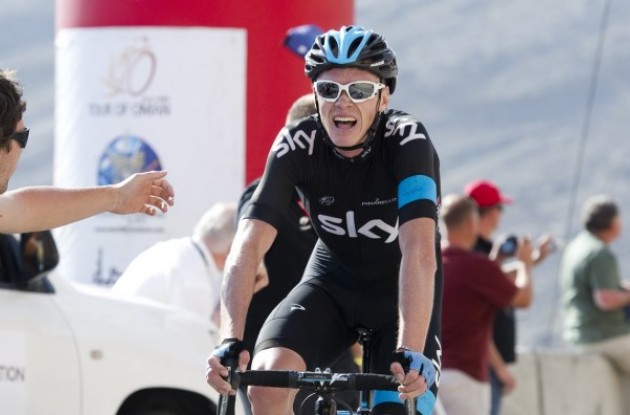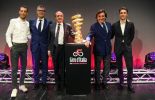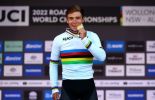Tour de France Course Report and Prediction
The 2013 Tour de France will feature fewer sprint stages than usual and more hilly stages, which should produce more aggressive racing. The race will have six mountain stages, four with summit finishes, a team time trial, and two individual time trials, one of which is a mountain time trial. The Tour de France is never easy, but this year’s edition might dole out more than the usual amount of pain.
The 100th Tour de France will begin on Corsica, the only department of metropolitan France that the La Grande Boucle has never visited. The first three stages will occur on the hilly, twisting, turning roads of the island. Stage 1 will be a flat, 213-km run from Porto Vecchio to Bastia. A sprinter should take this stage, but a bunch sprint is unlikely for Stage 2, a 156-km ride from Bastia to Ajaccio, Napoleon Bonaparte’s birthplace. The ride will feature two Category 3 ascents, one 12 km from the finish, and two Category 2 climbs that should shell many of the sprinters. Stage 3, a 145.5-km ride from Ajaccio to Calvi, will feature four categorized climbs, including a Category 2 ascent 14 km from the finish. This stage should be taken by a small group of escapees.
Stage 4 will take place in Nice. The flat, 25-km team time trial will be the first opportunity for teams to demonstrate their strength. Sky, Garmin-Sharp, and BMC should fight for the win.
Stage 5 will be a rolling, 228.5-km run from Cagnes-sur-Mer to Marseilles, should be won in a bunch sprint. Stage 6, a flat, 176.5-km run from Aix-en-Provence to Montpellier, should be decided the same way. The following stage, a 176.5-km ride from Aix-en-Provence to Montpellier, will have four categorized climbs—two Category 2s, a Category 3, and a Category 4—that might embolden escapees. The bunch, however, should reel them in and set up a sprint.
Stage 8 will be the 2013 Tour’s first Pyrenean stage. The 195-km ride from Castres to Ax 3 Domaines will feature the hors categorie Col de Pailheres and the Category 1 ascent to the finish. This stage and the following one, a 168.5-km ride from Saint Girons to Bagneres-de-Bigorre that will feature four Category 1 climbs before a downhill run to the finish, will leave no doubts about who is a contender. The first of the race’s two rest days will follow Stage 9.
After leaving the Pyrenees, the Tour will move to Brittany for Stages 10 and 11. The former will be a flat, 197-km run from Saint-Gildas-des-Bois to Saint-Malo that should end in a sprint, while the latter will be a flattish, 33-km individual time trial from Avranches to Mont Saint-Michel. Riders such as Christopher Froome (Sky) and Cadel Evans (BMC) should excel in the race of truth.
From Brittany, the riders will head southeast toward the Alps. Stage 12 will be a flat, 218-km ride from Fougeres to Tours, while Stage 13, which will begin in Tours and end in Saint-Amand-Montrond, will also be flat but “only” 173 km in length. Stage 14, a 191-km ride from Saint-Pourcain-sur-Sioulle to Lyon, will feature seven categorized climbs, all of which will be Category 3s and 4s. The climbs will not be particularly arduous, but with the Alps looming, the peloton might not chase a breakaway.
Stage 15 will be a one-trick pony, but what a trick! The 242.5-km run from Givors to Mont Ventoux will end with the fabled hors categorie climb to the finish. The stage, the longest of this year’s Tour, will have four other categorized ascents, but none tougher than Category 3. The stage, and for some the Tour, will come down to the climb to the finish.
Stage 16 will be a deceptively challenging one. The 168-km ride from Vaison-la-Romaine to Gap will feature three Category 2 ascents, the last coming only 12 km from the finish. It appears to be a stage that a late escape will decide, but a contender who steals a march on the competition or one who is not alert could gain or lose time.
Stage 17 will be the second individual time trial of this year’s Tour. This event will be a mountain time trial. The 32-km ride from Embrun to Chorges will take the riders over two Category 2 climbs. Riders such as Christopher Froome (Sky) and Alberto Contador (Saxo Bank-Tinkoff) should stand out and take time out of their rivals.
Stage 18 will be a 168-km ride from Gap to L’Alpe d’Huez. The riders will breast the famous climb twice, the second time at the end of the stage. Look for a battle at the second of these two climbs, with Contador, Froome, Alejandro Valverde (Movistar), Joaquim Rodriguez (Movistar), Evans, and others fighting for the yellow jersey.
Stage 19 will be more pain for the riders. The 204.5-km ride from Bourg d’Oisans to Le Grand-Bornand will take the riders over the hors categorie Col du Glandon and Col de la Madeleine, the Category 2 Col de Tamie, and the Category 1 Col de l’Epine and Col de la Croix Fry before descending to the finish. A no-hope climber might take this stage, with the heads of state doing battle behind him.
Stage 20 will be the final opportunity for contenders and climbers to take time out of their rivals or win a stage. The ride from Annecy to Annecy-Semnoz will feature six categorized climbs, with the Category 1 Mont Revard at 78.5 km and the hors categorie ascent to the finish being the most important. The stage should be fiercely contested because Stage 21, a flat, 133.5-km run from Versailles to the Champs Elysees, will be a procession for the overall winner.
Who will the winner be? Two men go to the head of the class. The first is Froome. The 28-year-old Kenya-born Briton has demonstrated that he has all of the tools to win the Tour de France. Last year, he demonstrated more climbing ability than Bradley Wiggins, his team captain, and Froome’s silver medal at last year’s Summer Olympics speaks volumes about his time trialing. In addition, Froome has an outstanding team supporting him. It all adds up to the Sky man winning the Tour de France.
The second man at the head of the class is Contador. The two-time Tour winner knows how to win the race and has the climbing skills to match Froome’s. However, Contador is not quite on Froome’s level in the race of truth , and he is not always alert tactically. However, the Spaniard has Bjarne Riis as his directeur sportif, and he will have a good team working for him. The Saxo Bank-Tinkoff rider should be good for second.
Theoretically, Evans should not be a contender at age 36. The Australian is, however, and he has what it takes to be factor in the race. The 2011 Tour winner can climb well and ride against the clock. He has a good tactical sense, and the BMC man has a good team backing him. However, Evans’s passivity can hold him back, and it will in this Tour. He will be good enough to reach the podium, but not good enough to win.
Joaquim Rodriguez (Katusha) is second to none in the high mountains. However, his time trialing must improve if he is to reach the podium. He might do very well in the mountain time trial (Stage 17), but he cannot lose two to three minutes in the Stage 10 race of truth and hope to win. The Spaniard has a very good team helping him.
Alejandro Valverde (Movistar) has always had the climbing ability to compete in grand tours, and his sprinting ability could make the difference in picking up bonus seconds at the ends of stages. Valverde is an experienced Tour rider who has won four stages of La Grande Boucle. However, time trialing has never been the Spaniard’s strong suit, although he will have a strong team to assist him in the team time trial and in the mountains.
Tejay van Garderen (BMC) has good climbing ability and excellent time trialing skill. Moreover, he is part of a fine team in BMC. However, the American will not be a free agent. He will work for Evans, and that will limit his chances to show what he can do. Van Garderen is a very talented rider who might someday win the Tour de France, but his time is in the future, not now.
Jurgen Van den Broeck (Lotto-Belisol) is a good climber, but not one of the best. Moreover, his time trialing has been disappointing for someone who was a world junior time trial champion. In addition, the Belgian is on a team that is splitting its attention between Van den Broeck and sprinter Andre Greipel. The team is not fully committed to Van den Broeck’s GC aspirations. That being the case, a top ten finish is as much as the Lotto-Belisol man can hope for.
At 22, Thibaut Pinot (Francaise des Jeux) was the youngest rider in last year’s Tour de France. The Frenchman won Stage 8, pulling away from the field and holding on for the win as directeur sportif Marc Madiot nearly fell out of his car cheering Pinot on. He finished second to van Garderen in the best young rider competition, and because he will be the leader of Francaise des Jeux, Pinot will be free to make his own moves. The Francaise des Jeux man is less well-rounded than the American, and time trialing is not his strength. That lack of proficiency will keep him from moving up on GC, although he might win the best young rider competition.
Nairo Quintana (Movistar) will make his Tour de France debut in 2013. He has shown amazing potential by taking the queen stage of the Tour of the Basque Country en route to overall victory. Moreover, the Colombian finished second to world time trial champion Tony Martin (Omega Pharma-Quick Step) in the race’s final time trial. He will be working for Valverde, however, and that will limit his options. However, riding for Valverde will give Quintana the opportunity to learn and to prepare himself for future editions of the Tour.
Since winning the 2011 Giro d’Italia, Ryder Hesjedal (Garmin-Sharp) has had nothing but bad luck. The Canadian crashed out of last year’s Tour, abandoned this year’s Giro because of illness, and crashed out of the 2013 Tour de Suisse. Because Hesjedal has abandoned races that he was using to prepare for the Tour, his fitness might be suspect. At his best, he is a very good climber and a good time trialist. If he can regain the form that won him last year’s Giro d'Italia, he might make an strong impact on the race.
Check in at www.roadcycling.com for daily reports on the Tour de France and follow Roadcycling.com on Twitter, Facebook and Google+. Help us spread the word about RoadCycling.com by sharing links to our articles and by linking to RoadCycling.com from your Web site or blog.

